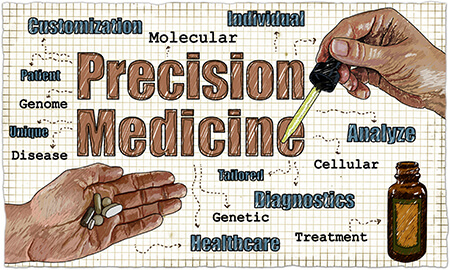
Precision Health Partnerships Are Vitally Important

Several years ago, the North Carolina Biotechnology Center decided the timing was right for our state to take a leadership role in precision health.
The rapid pace of innovation in this field of medicine promises to transform healthcare, as we know it. By considering the genetic, lifestyle and environmental factors that influence people’s health, we can develop more personalized ways to prevent illness and promote wellness for all North Carolinians – and for people everywhere. Instead of trying to cure diseases after the fact, we have the potential to prevent many conditions from occurring in the first place.
The hard work has begun; significant progress has been made. Precision medicine is opening the door to enormous opportunity. And that’s driving an influential group of leaders from academia, business and government — through the North Carolina Precision Health Collaborative (NCPHC) — to establish our state as one of the country’s key precision health knowledge hubs.
We’re confident we can achieve that goal because we have tremendous resources at our disposal—some of the best research universities in the country, strong and rapidly growing precision medicine assets, highly regarded healthcare systems, big data and information technology organizations, and engagement by a variety of additional stakeholders in the ecosystem.
Strong collaborations build precision health leadership
We realize one of our big challenges is to build strong collaborations and interconnectivity among the various players in precision health. That way we all can strategically work together toward a common objective—to more effectively address North Carolina’s healthcare challenges.
That’s a primary reason the NCPHC was created in 2016. Terry Magnuson, Ph.D., vice chancellor for research at the University of North Carolina at Chapel Hill and a geneticist who is a founding member of NCPHC, explains it best: “Collaboration is key to our success in precision health. If we all work better together, we can make a real difference in people’s lives. And we can bring about change much faster collectively than we’d ever be able to accomplish individually.”
Dr. Magnuson—representing NCPHC—will talk more about North Carolina’s collaborative approach at the international conference of the Biotechnology Innovation Organization (BIO) in June. He’ll join a distinguished panel that includes Suzanne Belinson, MPH, Ph.D., executive director at Blue Cross and Blue Shield Association; Stephanie Devaney, Ph.D., deputy director at the National Institutes of Health; and Alicia Zhou, Ph.D., head of research at Color Genomics. The topic is “Partnerships Power Precision Health: Collaborative Models for Advancing Precision Medicine.”
We’re delighted to have this high-impact opportunity to discuss what we’re doing to build precision health partnerships in our state, and to learn from others on the panel and in the audience. Collaboration is crucial. The more opportunities we all have to work together—both in North Carolina and beyond—the better.
For questions or more information, contact:
Sara Imhof, Ph.D.
Vice President, Focused Initiative Team
Focused Initiatives
919-549-8842
| sara_imhof@ncbiotech.org
